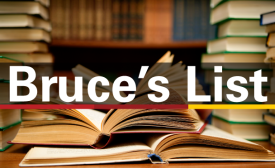soft power
To understand soft power with Chinese characteristics, we must think of two key concepts in international relations of the Asian giant – peaceful development and a harmonious world. [...] Development as a clear gamble to consolidate its role of a power without threatening the role of any other, especially of United States, in a logic of non-confrontation, although it will extend its influence in Africa, Asia and Latin America.
The latest iteration of China’s decade-old strategy of promoting indigenous innovation, “Internet Power” signals that the Party is no longer just reactive to the existential threat of the Internet; it is now seeking to utilize it for its own economic and political ends.

Bruce Gregory's first public diplomacy reading list of 2016.
In her examination of cultural diplomacy, Von Maltzahn looks briefly at its relationship with ‘soft power’, with the Europeans developing structured programmes between the world wars, followed lately by China, but with few Arab countries taking the practice seriously, other than recently through satellite television channels. Compared to Iran, Syria has had little desire to propagate its culture abroad.
The Parliamentary and Government taxpayer-funded art collections hold a combined 22,000 artworks, which are intended to promote British art and cultural diplomacy. But only a few of the pieces can be viewed for a fee by tourists visiting the House of Parliament, Sarah Cascone reports for artnet News.
The Brazilian foreign policy establishment rightly sees relations with emerging countries, so-called South–South diplomacy, as one of the pillars of Brazil’s global strategy. However, the crisis has reduced the country’s soft power and economic tools to attract these nations.
He suggested that the case could even be made that to travel is to do service for one's country. Travel and tourism, Whittingdale said, are a form of "soft power. Security is boosted by "greater understanding between countries," he observed. "The more people take advantage of the opportunity to visit other countries, and the more that [citizens of other countries] have exposure to visitors, that is a huge contribution."







